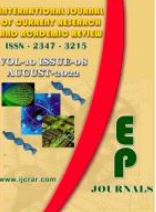Abstract Volume:10 Issue-8 Year-2022 Original Research Articles
 |
Online ISSN : 2347 - 3215 Issues : 12 per year Publisher : Excellent Publishers Email : editorijcret@gmail.com |
Ecological restoration of degraded ecosystems is a global priority. About two billion ha of land in the world was affected by various forms of natural and human-induced activities. Now a day, water erosion being the main contributor of land degradation and deforestation which threaten the survival of many species, and reduces the ability of forests to provide essential services. However, its impact is especially severe on the livelihoods of the poor, who were heavily dependent on natural resources. Several scientific reports highlighted in this review show the extent to which land degradation is threatening food security as well as ecosystem goods and services and depleting ecosystems in different regions of the world. Agroforestry encompasses a wide range of approaches and technologies for restoring degraded lands through afforestation and reforestation from intensive agriculture, soil erosion, deforestation, rangeland degradation, mining and over extraction at various scales. Agroforestry practices (AFP) also considered as climate-smart agriculture which have been designed for optimization of desired outputs, such as timber or fuelwood (agrisilviculture), or for specific land rehabilitation objectives. However, there is a need to involve different stakeholders to design effective AFP for supporting sustainable productivity of land and enhancing biodiversity and ecosystem services, to identify best practices to diversify AFP and better understand soil properties and land use in degraded landscapes. It play an effective role in improving soil fertility, conserving biodiversity, enhancing carbon sequestration and providing climate change mitigation and adaptation. In general, tree planting through agroforestry should be an integral part of rural development programs and should provide the community with food, fuelwood, income, and environmental benefits. Increasing public awareness through education about forestry and natural resource conservation is vital if Ethiopia wants to maintain the remaining natural forests and biodiversity.
How to cite this article:
Habtamu Ayele, Nigatu Ararso and Zenebe Reta. 2022. Agroforestry Practices in Centeral Ethipoia: Implication for Deforestation and Land Degradation Management.Int.J.Curr.Res.Aca.Rev. 10(8): 133-140doi: https://doi.org/10.20546/ijcrar.2022.1008.010



Quick Navigation
- Print Article
- Full Text PDF
- How to Cite this Article
- on Google
- on Google Scholor
- Citation Alert By Google Scholar
